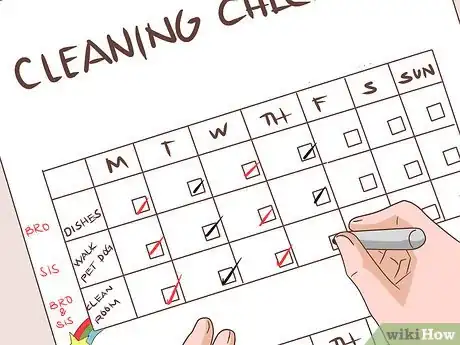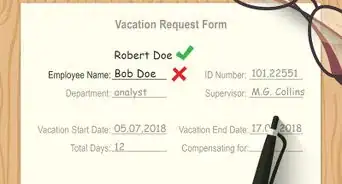This article was co-authored by Wits End Parenting. Wits End Parenting is a parent-coaching practice based in Berkeley, California specializing in strong-willed, “spirited” children with impulsivity, emotional volatility, difficulty “listening,” defiance, and aggression. Wits End Parenting's counselors incorporate positive discipline that is tailored to each child’s temperament while also providing long-term results, freeing parents from the need to continually re-invent their discipline strategies.
There are 14 references cited in this article, which can be found at the bottom of the page.
This article has been viewed 52,407 times.
Kids are curious creatures, so you may think that they can motivate themselves. Sometimes, though, kids need a helping hand to stay motivated and focused on things that are important. Learning how to motivate your kids can help you keep them on track to a fulfilling and meaningful childhood.
Steps
Finding Motivational Strategies That Work
-
1Set clear goals with defined consequences.[1] A good way to motivate your child is to have goals that are well-defined, and to offer both rewards for when the goals are met and punishments if the goals aren't met. It's best to avoid bribing your child, but having rewards and punishments in place can help instill a sense of duty and obligation in your child.[2]
- Be absolutely clear with what you want your child to accomplish.
- Use specific means of measurement, like getting a B or higher on a test or finishing all of his/her homework or chores by a certain time.
- Set clear consequences that will take effect if your child doesn't do what's expected of him or her. For example, you might take away TV and/or internet privileges or suspend your child's allowance for the week.
- Enforce the rules with your children. If they don't do what's expected of them, they will need to learn that there will be consequences.
- Your child will come to realize that getting things done feels good while not doing them leads to feeling bad, and your child will eventually learn to motivate himself or herself.
- It's important to recognize when you're putting too much pressure or any unreasonable pressure on your child. If you show any kind of disappointment when they fail, for example, you're probably pushing your children too hard and making them feel tremendous pressure.
- If you offer rewards as an incentive, make sure you're not offering physical prizes/treats. Instead, offer your child quality time together (perhaps through a day spent together at the park) or additional time at something he or she already has (like extra TV time).
-
2Use positive reinforcement instead of bribery. Bribing kids may seem like a good idea, and it will get some results. However, it only motivates kids to earn a treat or prize, rather than instilling any kind of real work ethic or desire to help.[3]
- Rewards only work for as long as the rewards keep coming, or as long as a parent/guardian is in the room to see the kid working.
- Positive reinforcement, like earning time to play video games or go out with friends, is more successful as a motivator than simple bribery.[4]
- If you want to offer healthy, meaningful rewards, try offering quality time spent with one or both parents as a way to motivate your child.[5] This type of positive reinforcement can help motivate your child while also avoiding a "bribe"-based reward system.
Advertisement -
3Teach value induction to get kids motivated. Value induction means explaining your values and imparting those values to your child. By teaching your child that he or she should do something for specific reasons (with long-term repercussions), it's much more likely that your child will end up being able to motivate himself or herself.[6]
- Value induction has been proven to produce lasting effects in kids.
- Once a child has learned a value system, that kid will be more likely to take up some or all of that value system and act out of real motivation.
- Values can be as simple as, "Education is the most important thing. Without an education, you won't be able to accomplish your dreams when you grow up."
- You can help your kid develop his/her own motivational value system by asking who or what that child wants to be when he/she grows up. You can then remind the child, "If you want to be like ______, you need to finish your homework. ________ always put his homework and chores ahead of play time."
-
4Lead by example.[7] If you want your child to do something, you're probably going to have to do it yourself as well. This is true of work, cleaning, or finishing projects that have been started. Rather than leaving yourself open to accusations of "it's not fair," show your child that you do the same things he/she does and find those activities rewarding.[8]
- Many kids idolize adults. If your child sees you doing chores and you tell him how satisfying it is to have a clean house, he or she is more likely to help out.
- If you're trying to lead by example with school work, take an active interest in your kid's education. You can also try taking a class at your local community college in something that interests you so that your kid will see you prioritizing education.
Motivating Kids for School
-
1Learn about your child's interests and help them develop.[9] Every kid has something they find interesting, weird, or cool. Most of those interests can be tied to some area of study (often science, especially for kids who like playing outside and catching things). As a parent, the best way you can encourage those interests is by learning about what your child finds interesting at the moment and encouraging your child to fully explore that topic.[10]
- Ask your child from time to time what he or she is most interested in. Try to get beyond cartoons or toys to find out what subjects and ideas he or she finds most intriguing.
- Explore your child's areas of interest together by visiting museums, planetariums, and/or wilderness areas.
- Show interest and enthusiasm in the things your child gets excited about. For example, if your child is interested in stars, learn as much as you can about stars and buy your child a telescope or astronomy books geared towards kids.
- If your child is interested in art, take trips to your local art galleries and buy your child drawing or painting supplies. This can get your child excited about existing art while giving your child the tools to make his or her own art.
-
2Foster a learning environment at home. Learning extends beyond school. Your child brings home schoolwork and studies at home, but it's important to encourage other areas of interest as well. Whether your child is interested in reading, math, history, art, or something else entirely, make time and space at home for your child to explore those interests.[11]
- Give your child as many books, magazines, and reading supplements as he or she can read.
- Spend time reading, either together or separately in the same room. If your child is still struggling with reading on his/her own, help out and read a book together.
- Help your child engage with different learning styles. For example, playing with blocks can help kids with sorting, sequencing, and problem solving, especially kids who have a more tactile learning style.
- Be enthusiastic about the new things that you learn, and show your child that it's good to be excited about learning new things.
-
3Make your expectations clear to your child. Every child has areas that they excel in and areas they struggle with. This is normal, but as a parent you'll need to help motivate your child to do really well in both areas.[12]
- Talk to your child about how you expect him or her to do well in school. Expecting your kids to perform well can help them succeed, while expecting them to perform poorly can lead a child to stop trying.
- Ask your child for honest input on what subjects he or she feels come easiest in school, then ask about which subjects are the most difficult for your child.
- Focus your greatest expectations on the subjects your child does well in, and give your child extra attention and study/homework help on the subjects your child struggles with.[13]
- Sit down with your child to reassess his or her strengths and weaknesses every two to three months, and adjust your areas of expectation accordingly as your child's interests and strengths develop.
-
4Offer your support when your child struggles. Some children may feel like they can't ask a parent for help out of fear that it may come across as a sign of weakness. Avoid that pitfall altogether by taking an active role in your child's education and helping him/her out with difficult assignments before your child has to ask for your help.[14]
- Help your child with homework every night, but be on the lookout for things that your child is struggling with more than others. Those subjects and activities will need the most guidance and instruction.
- If your child isn't good at something, help out and provide instruction/guidance.
- Kids might say they find something boring or dumb when they don't know how to do that activity. If your child says something along the lines of, "Our homework assignment was dumb," you may need to offer extra help and guidance.
-
5Praise your child's efforts, even if he/she doesn't succeed. Children need to know that they are loved no matter what happens. Some children may fear that doing poorly on a test will disappoint their parents. While you'll need to convey to your child that a poor grade is bad and needs more work, it's important to acknowledge your child's efforts, regardless of the outcome.[15]
- Praise can help keep kids motivated, but if your child is struggling in school he or she may not be getting very good grades.
- Rather than discouraging your kid for trying and failing, celebrate his or her efforts while also motivating your child to do better next time.
- Take more of an active role if your child is struggling in school. Offer support and help your child work through difficult assignments.
Getting Kids Excited About Music, Sports, and Other Hobbies
-
1Encourage hobbies of all kinds. It's good for children to have things they're excited about. No matter what your child wants to explore, you should be supportive and encouraging as much as possible.
- Some kids will want to take up musical instruments, while others may want to play sports. Some kids will want both, and some won't want either.
- Find out what your child is interested in and encourage him/her to explore that interest.
- If your child shows an interest in something, sign him or her up for lessons/classes, or (in the case of sports) try to enroll your child in a youth league for beginners.
- You should also try to enjoy the things your child enjoys. Watch sports matches together, listen to music together, and go see live performances.
-
2Set daily or weekly goals with specific outcomes. Having specific goals makes it easier to motivate your child. No matter what hobbies your child is interested in, taking an active role should mean setting attainable goals for your child and pushing him/her to achieve those goals.
- Goals with specific outcomes can be more challenging (and therefore more engaging) than just general goals like practice times.
- For example, instead of having your child practice a musical scale a certain number of times, give your child a concrete and challenging goal like practicing until he/she can play the first four or eight measures of a song without error.
-
3Motivate your child to get physically active. Your child doesn't necessarily need to get involved in sports (although if he or she wants to, you should encourage it). Kids do need plenty of exercise, though, as being physically active will help your child feel better, have a more positive outlook, and get a more restful night of sleep.[16]
- Physical activity helps build strong muscles and bones while managing/preventing weight gain. These are results that your child can see and feel good about.
- Most kids will get active if they're given the right tools. Take your child to the park or a playground, give him/her equipment to play ball with, and make it a fun activity that you can join in on (if your kid wants you to).[17]
- Encourage your child to get active with his/her friends. Take them to the park to play ball together, run obstacles through the playground, etc.
- Teach your child to ride a bike, using training wheels at first and gradually riding without them. This is a great form of exercise and can allow your child to ride to/from friends' houses and the park (as long as it's safe to ride a bike in your neighborhood).
- Always have your child wear a helmet whenever riding a bike, and teach your child basic safety measures like wearing visible colors, staying out of traffic, and using hand signals to let others know when your child is stopping or turning.
-
4Remember that your child's interests will change. Most kids go through cycles of interest where something new and exciting takes the place of an older interest. This is natural, and it's normal. No matter what hobbies your child pursues, it's important to remember that the greatest thing in the world today may be old news in a few months - and that's okay.[18]
- Don't discourage your child from exploring new interests, and don't force your child to keep participating in a hobby or sport he/she doesn't enjoy any longer.
- It may be frustrating, especially if you spent a lot of money on instruments or equipment. For this reason, it may be best to rent equipment and instruments until your child knows it's something worth sticking with (especially with equipment, which your child will outgrow).
- Remember that forcing your child to keep doing something he/she no longer enjoys will discourage your child from exploring interests and may make hobbies feel unfulfilling.
Encouraging Kids to Help With Household Chores
-
1Convey the importance of communal chores. Some children only do chores because it gets them an allowance. While you may choose to give your child an allowance, money alone shouldn't be the motivating factor. Explain to your child that you can't do everything by yourself, and that your child's help would give him/her some big, grown up responsibilities.[19]
- Chores can help your child have a sense of purpose at home.
- Chores can also let your kid feel like he or she is contributing to something bigger. Kids think of parents as running the household, but many kids love to play house - and chores let them actually help manage the home.
-
2Use chore charts, or make your own. Chore charts are a great way to track what needs to be done each week and which tasks have already been accomplished. You can find chore charts for free online to download and print, or simply make your own at home.[20]
- Chore charts can help your child see the tasks you expect to be completed on a list, rather than just thinking about them in his or her mind.
- As your child works through each task on the chore chart, have your child check them off or mark them complete with a sticker.
- Checking off items on a list can bring a sense of satisfaction and accomplishment, which is vital to your child's motivation in helping with chores.
-
3Make chores fun for kids. Chores may not be fun in and of themselves, but you can make chore time a fun family time together. Try to make your child see chore time as quality time with room for play and conversation (as long as the work gets done as well).[21]
- Listening to music while you cook or clean together can turn chores into a fun dance party.
- You and your child can pretend to be robots while you do certain chores, or reenact scenes from your child's favorite movies.
- Using cleaning tools like a feather duster, spray bottle, or vacuum cleaner can be fun for kids because these tools are so foreign yet familiar (largely from cartoons and movies).[22]
-
4Keep chores manageable. As you assign chores to your child, it's important to remember that a chore being finished by your child may not look the same as it would when finished by an adult. That's okay, and over time (through several years) your child will get better and more skilled at cleaning, cooking, and other household tasks. For the time being, though, make sure your expectations are reasonable and the workload is manageable for your child.[23]
- Don't expect a perfect, sparkling home. Your children are still kids, not professional cleaners, and there are limits to what they're capable of.
- Break chore time into smaller, more manageable chunks. Instead of having a consecutive hour of cleaning, for example, you might set a timer for 15 minutes of cleaning and take little breaks together between each chunk of time.
-
5Change up the chores from time to time. Veering away from a predictable routine will help keep chores interesting and (hopefully) fun for your child. If you have multiple kids, you can alternate their chores. If you just have one kid, you can make him/her a new chore chart every two weeks or every month - that way your child will get used to changing assignments and get exposed to a wider range of tasks.[24]
- Switching out tasks between multiple kids or between one kid and one parent can keep things interesting. If your child has to do the same chores every week it might get repetitive and stop being fun.
- One way to switch out chores if you have more than one child would be to have each kid clean their sibling's room instead of their own. This may make older kids uncomfortable (especially if they value privacy), but for younger kids it can help change things up.
- Don't be afraid to give kids some more difficult tasks. Many kids find these tasks fun, while easier chores are sometimes seen as being boring.[25]
-
6Praise completed chores and celebrate the effort.[26] Don't take your child's work for granted. It takes a lot more work for your child to finish all of the chores you assigned than it would take for you, and if you want your child to stay motivated you'll need to give him/her praise and some sense of accomplishment.[27]
- Praise your kids when they finish their chores, and thank them for their work.
- Let your child feel like part of the household by saying something like, "Thank you for all your hard work. We're a good team, and I couldn't have done it without your help."[28]
- Do something fun with your kids when they finish all their chores.
- You might try taking them out to see a movie, or going out for ice cream sundaes.
- If your child hasn't finished the chores he or she was given, wait until those chores are completed. Don't let your child go to his/her room or play until the chore is complete, and withhold celebrations that week since your child didn't stay motivated.
Expert Q&A
-
QuestionWhat is the worst way to motivate your child?
 Wits End ParentingWits End Parenting is a parent-coaching practice based in Berkeley, California specializing in strong-willed, “spirited” children with impulsivity, emotional volatility, difficulty “listening,” defiance, and aggression. Wits End Parenting's counselors incorporate positive discipline that is tailored to each child’s temperament while also providing long-term results, freeing parents from the need to continually re-invent their discipline strategies.
Wits End ParentingWits End Parenting is a parent-coaching practice based in Berkeley, California specializing in strong-willed, “spirited” children with impulsivity, emotional volatility, difficulty “listening,” defiance, and aggression. Wits End Parenting's counselors incorporate positive discipline that is tailored to each child’s temperament while also providing long-term results, freeing parents from the need to continually re-invent their discipline strategies.
Parenting Specialists Using rewards like physical treats (whether they're toys, snacks, or other "prizes") is not an effective long-term strategy, and it won't help your child develop his or her own self-motivating skills.
Using rewards like physical treats (whether they're toys, snacks, or other "prizes") is not an effective long-term strategy, and it won't help your child develop his or her own self-motivating skills. -
QuestionWhat's the best way to motivate my children?
 Wits End ParentingWits End Parenting is a parent-coaching practice based in Berkeley, California specializing in strong-willed, “spirited” children with impulsivity, emotional volatility, difficulty “listening,” defiance, and aggression. Wits End Parenting's counselors incorporate positive discipline that is tailored to each child’s temperament while also providing long-term results, freeing parents from the need to continually re-invent their discipline strategies.
Wits End ParentingWits End Parenting is a parent-coaching practice based in Berkeley, California specializing in strong-willed, “spirited” children with impulsivity, emotional volatility, difficulty “listening,” defiance, and aggression. Wits End Parenting's counselors incorporate positive discipline that is tailored to each child’s temperament while also providing long-term results, freeing parents from the need to continually re-invent their discipline strategies.
Parenting Specialists One helpful way is to act the way that you want them to behave. That way, they learn what behavior you expect from them.
One helpful way is to act the way that you want them to behave. That way, they learn what behavior you expect from them.
References
- ↑ Wits End Parenting. Parenting Specialists. Expert Interview. 5 March 2020.
- ↑ http://www.webmd.com/parenting/raising-fit-kids/mood/slideshow-motivate-your-kids
- ↑ https://www.psychologytoday.com/blog/old-school-parenting-modern-day-families/201505/what-really-motivates-kids
- ↑ http://www.scholastic.com/parents/resources/article/motivate-school-success/10-ways-to-motivate-your-child-to-learn
- ↑ http://www.webmd.com/parenting/raising-fit-kids/mood/slideshow-motivate-your-kids
- ↑ https://www.psychologytoday.com/blog/old-school-parenting-modern-day-families/201505/what-really-motivates-kids
- ↑ Wits End Parenting. Parenting Specialists. Expert Interview. 5 March 2020.
- ↑ http://www.webmd.com/parenting/raising-fit-kids/mood/slideshow-motivate-your-kids
- ↑ Wits End Parenting. Parenting Specialists. Expert Interview. 5 March 2020.
- ↑ http://www.scholastic.com/parents/resources/article/motivate-school-success/10-ways-to-motivate-your-child-to-learn
- ↑ http://www.scholastic.com/parents/resources/article/motivate-school-success/10-ways-to-motivate-your-child-to-learn
- ↑ http://www.iowanationalguard.com/Family%20and%20Services/Youth%20Programs/Documents/Youth_Documents/7%20Ways%20to%20Motivate%20Children%20in%20School.pdf
- ↑ http://www.scholastic.com/parents/resources/article/motivate-school-success/10-ways-to-motivate-your-child-to-learn
- ↑ http://www2.ed.gov/parents/academic/help/adolescence/partx4.html
- ↑ http://www.webmd.com/parenting/raising-fit-kids/mood/slideshow-motivate-your-kids
- ↑ http://kidshealth.org/en/parents/active-kids.html
- ↑ http://kidshealth.org/en/parents/active-kids.html#
- ↑ http://kidshealth.org/en/parents/active-kids.html
- ↑ http://www.parents.com/kids/development/social/motivate-kids-to-do-chores/#page=7
- ↑ http://www.parents.com/kids/discipline/rewards/downloadable-chore-charts/
- ↑ http://www.parents.com/kids/development/social/motivate-kids-to-do-chores/#page=3
- ↑ https://www.psychologytoday.com/blog/growing-friendships/201303/chores-and-children
- ↑ https://www.psychologytoday.com/blog/growing-friendships/201303/chores-and-children
- ↑ http://www.parents.com/kids/development/social/motivate-kids-to-do-chores/#page=6
- ↑ http://www.parents.com/kids/development/social/motivate-kids-to-do-chores/#page=4
- ↑ Wits End Parenting. Parenting Specialists. Expert Interview. 5 March 2020.
- ↑ https://www.psychologytoday.com/blog/growing-friendships/201303/chores-and-children
- ↑ http://www.parents.com/kids/development/social/motivate-kids-to-do-chores/#page=7


-Step-2-Version-2.webp)












































































